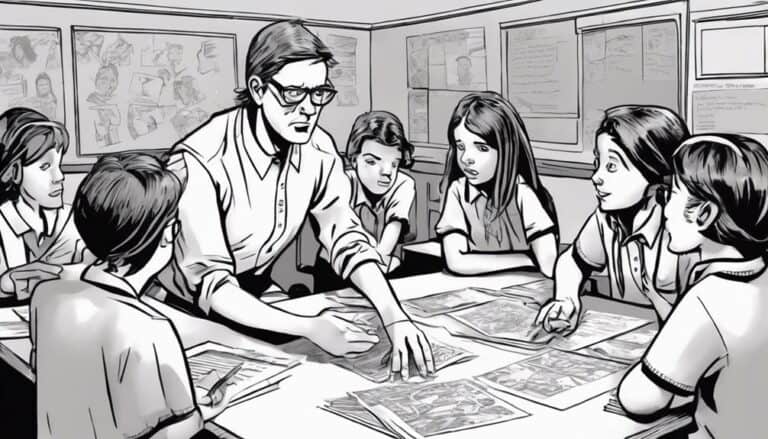Integrate critical thinking exercises seamlessly into your daily lessons. Utilize wasted time for reflection, identifying behavior patterns and aligning with long-term goals. Encourage active problem-solving by defining daily problems clearly and seeking relevant information. Hone intellectual standards like clarity and accuracy weekly for progression. Maintain structured intellectual journals to monitor growth and identify areas for development. Analyze group influences to challenge biases and foster independent thinking. These strategies create a dynamic environment for developing critical thinking skills effectively.
Key Takeaways
- Incorporate real-life scenarios for practical application of critical thinking skills.
- Encourage students to analyze, evaluate, and solve daily problems independently.
- Integrate group discussions to challenge biases and promote diverse perspectives.
- Implement reflective exercises during perceived time wastage for self-awareness.
- Focus on intellectual standards like clarity and accuracy in daily lessons.
Utilizing Wasted Time for Reflection
Utilize moments of perceived time wastage to engage in reflective exercises that enhance self-awareness and promote personal development. By reflecting on how time is utilized throughout the day, you can identify patterns in your behaviors that may be hindering your productivity. Understanding your daily strengths and weaknesses during these moments of wasted time allows for self-awareness to flourish. Evaluating your alignment with long-term goals during these periods can lead to improved time management strategies.
By recording observations and recognizing patterns in your behavior, you can gain valuable insights into areas for improvement.
This practice of utilizing wasted time for reflection fosters mindfulness and intentional use of time for personal growth. It provides an opportunity to pause, assess, and realign your actions with your goals. Through this process, you can make conscious decisions to improve your time management skills and enhance your overall productivity. Embracing reflection during moments of perceived time wastage is a powerful tool for self-improvement and development.
Engaging With Daily Problems
To effectively develop critical thinking skills in students, it's important to define daily problems clearly and guide them in active problem-solving strategies. Encourage students to actively seek relevant information when faced with daily challenges. By engaging with daily problems, students can apply critical thinking skills to real-life scenarios.
Teach students to evaluate short and long-term options, considering the potential consequences of each choice. Monitoring the implications of the actions taken to solve daily problems is vital for their critical thinking development. Engaging with daily issues provides opportunities for students to practice critical thinking in practical situations, enhancing their ability to think analytically and make informed decisions.
Internalizing Intellectual Standards
Internalizing intellectual standards involves honing your focus on clarity, precision, accuracy, and relevance in your thinking process. To internalize these standards effectively, it's beneficial to practice one intellectual standard weekly. By dedicating time to each standard, such as clarity or relevance, you can enhance your critical thinking skills progressively.
Utilizing techniques like providing elaboration and examples can further solidify your understanding and application of these standards in your reasoning.
Additionally, seeking clarification from others when needed can aid in grasping complex intellectual standards and applying them in various scenarios. Keeping track of your progress in internalizing and applying these standards can be achieved through weekly journal entries. Reflecting on how you have incorporated clarity, precision, accuracy, and relevance in your thinking throughout the week can help reinforce these standards in your mind, leading to more effective critical thinking abilities.
Keeping Intellectual Journals
Shifting from internalizing intellectual standards, an effective way to enhance your critical thinking skills is by starting to keep intellectual journals where you can reflect on your experiences and learning weekly.
When it comes to keeping intellectual journals to improve critical thinking skills, consider the following:
- Structured Entries: Organize your journal entries with numbered stages to help track progress in your critical thinking development effectively.
- Self-Reflection: Reflect on your daily strengths and weaknesses in the journal, as this aids in boosting self-awareness and identifying areas for improvement in your critical thinking skills.
- Monitoring Growth: Utilize intellectual journals as a tool for monitoring your critical thinking growth, allowing you to identify patterns, strengths, and areas that need further development.
Analyzing Group Influences
Understanding how group biases and influences impact critical thinking is essential for developing effective analytical skills. In a school setting, group dynamics can greatly shape personal beliefs and decision-making processes. It's vital to challenge group norms that might hinder critical thinking to foster independent analysis.
Encouraging students to seek diverse perspectives within the group can enhance their critical thinking and decision-making abilities. By questioning and analyzing group influences, individuals can develop a more thorough and well-rounded understanding of various issues.
Incorporating critical thinking exercises into everyday lessons can provide opportunities for students to practice independent thinking and evaluate information from different angles. By actively engaging with group influences and biases, individuals can strengthen their analytical skills and make more informed decisions based on thoughtful consideration and diverse viewpoints.
Analyzing group influences is a valuable aspect of promoting critical thinking within educational environments.
Conclusion
So, now that you've learned about integrating critical thinking exercises into your everyday lessons, you'll never look at teaching the same way again.
Remember, the key is to make the most of wasted time, engage with daily problems, internalize intellectual standards, keep those journals handy, and analyze those group influences.
Who knew that critical thinking could be so seamlessly integrated into your teaching routine?
Happy thinking!

